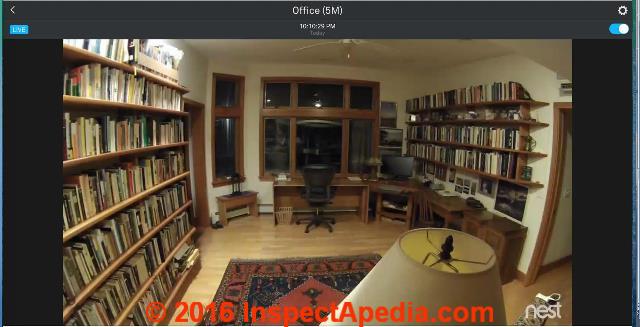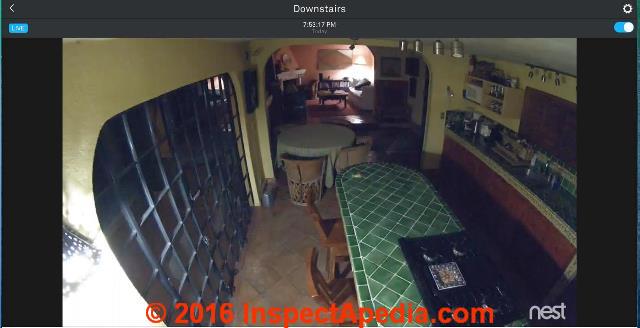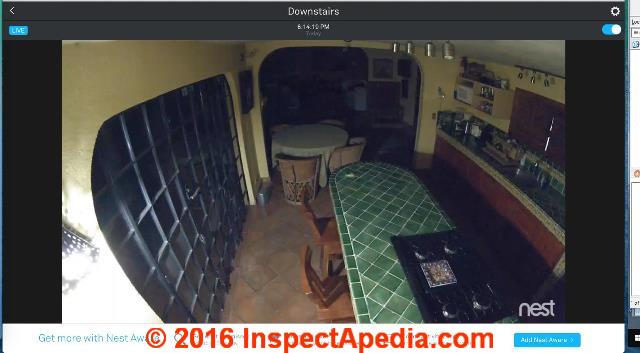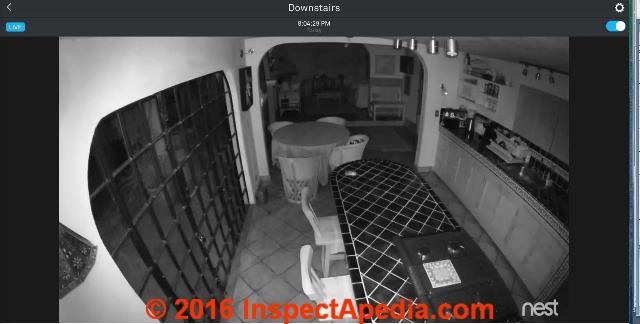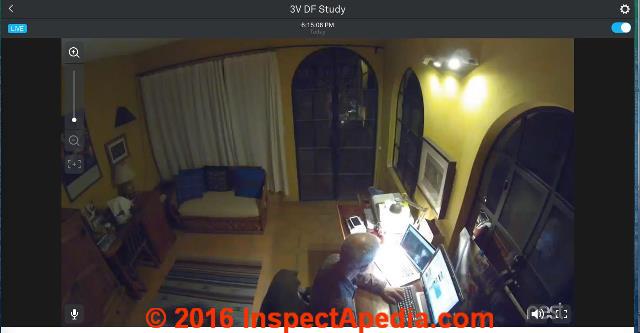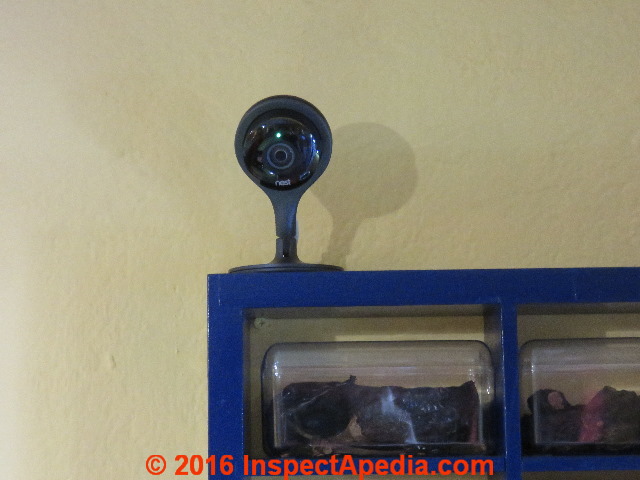 Adjust Room Lighting When Using a Nest Cam®
Adjust Room Lighting When Using a Nest Cam®
Avoid Nest Cam image washout by proper placement of other room lights
- POST a QUESTION or COMMENT about how to buy, install, debug, & make best use of a home security system using the Nest Cam®
Nest Cam lighting recommendations:
This article describes pitfalls to avoid when locating your Nest Cam or when placing other room lights that may interfere with the night-vision ability of the Nest Cam.
A too-bright light source close to the Nest Cam can cause other areas in the field of view to go dark.
This article series describes the Nest Cam installation procedure and includes advice on settings that can get you out of trouble if your camera installation does not go smoothly.
To get the very best performance from your Nest Cam (or Dropcam) we give advice on camera location, use of lighting, and securing the cameras and their wiring.
InspectAPedia tolerates no conflicts of interest. We have no relationship with advertisers, products, or services discussed at this website.
- Daniel Friedman, Publisher/Editor/Author - See WHO ARE WE?
Lighting Advice for Working with the Nest Cam
Watch out: in dark conditions the placement of an artificial light source may interfere with rather than assist the Nest Cam's view of the area it is monitoring. In particular we found that a bright lamp placed too close to the camera's lens will prevent good use of the camera's infra-red capability.
This office view recorded by another of our Nest Cams is lit by a single overhead ceiling light at the upper left. This works fine. But if that lamp in the lower-right foreground were turned on its light would overpower the image without giving enough light over the whole room.
Watch out: Separately at NEST CAM INFRA RED for DARK VIEWS we warn that even with all lights off in a room, objects in the foreground may reflect so much IR light back to the Nest Cam that as it adjusts to that brightness other areas that could be seen in the field of view may be left in darkness.
In the night-scene below, two lights were either left on or were turned on by a timer: in the screen shot's lower left a bright wall light washes out a small area of the image, while at the far end of this space (upper center in the image) a room lamp lights that area.
These lights work well together for night illumination for the Nest Cam in this location. But a single bright light on in part of the field of view that lights part of the area but not all of it may compete with the Nest Cam's IR capability. The result may be the unnecessary lost of parts of the image.
Above we see the same scene with just the nearby wall-light on. Notice that now the far end of the area is almost totally darkened. Now let's take a look - below - at the same scene once again, this time with all room lights off.
You can see that using just the Nest Cam's IR lighting, we actually have a more complete view of the entire space being monitored. I do notice a bit more IR light reflecting off of the left wall. If that reflected light were too bright thte Nest Cam would stop down its image and the more distant room areas would be all black. In that case I'd re-aim the camera, turning it slightly to the right to reflect less infra-red lighting off of the nearest wall.
The space shown above measures nearly 36 feet in its long dimension, a remarkable lighting performance for the infra-red lighting provided by the little Nest Cam.
Finally, shown below and captured by high-mounted Nest Cam, I am writing this article series working at a desk at night.
You can see that small bright lights on the wall illuminate the room and the desk light is so bright that it washes out a small area around my computer. These two lights provided enough lighting that the Nest Cam was not using its IR illumination.
While the precise Nest Cam lighting control algorithm that decides when to turn on or off the IR feather is not public, it's apparent that the Nest Cam software is making a decision about when to turn on the IR - basically almost any amount of in-room lighting from other sources will be relied upon by the Nest Cam system in preference to switching to Infra Red that will show up as a black-and white image.
...
Continue reading at NEST CAM RELIABILITY & NEST AWARE DATA LOSS or select a topic from the closely-related articles below, or see the complete ARTICLE INDEX.
Or see these
Recommended Articles
- BUILDING SAFETY HAZARDS GUIDE
- LIGHTING, EXTERIOR GUIDE - home
- NEST CAM INSTALLATION & USE - home
- NEST LEARNING THERMOSTATS
- SECURITY / MOTION SENSOR LIGHT INSTALL
- SECURITY SYSTEMS cameras, monitors for home security, intrusion, elder-safety, freeze or water damage monitoring
Suggested citation for this web page
NEST CAM LIGHTING RECOMMENDATIONS at InspectApedia.com - online encyclopedia of building & environmental inspection, testing, diagnosis, repair, & problem prevention advice.
Or see this
INDEX to RELATED ARTICLES: ARTICLE INDEX to BUILDING SAFETY
Or use the SEARCH BOX found below to Ask a Question or Search InspectApedia
Ask a Question or Search InspectApedia
Try the search box just below, or if you prefer, post a question or comment in the Comments box below and we will respond promptly.
Search the InspectApedia website
Note: appearance of your Comment below may be delayed: if your comment contains an image, photograph, web link, or text that looks to the software as if it might be a web link, your posting will appear after it has been approved by a moderator. Apologies for the delay.
Only one image can be added per comment but you can post as many comments, and therefore images, as you like.
You will not receive a notification when a response to your question has been posted.
Please bookmark this page to make it easy for you to check back for our response.
IF above you see "Comment Form is loading comments..." then COMMENT BOX - countable.ca / bawkbox.com IS NOT WORKING.
In any case you are welcome to send an email directly to us at InspectApedia.com at editor@inspectApedia.com
We'll reply to you directly. Please help us help you by noting, in your email, the URL of the InspectApedia page where you wanted to comment.
Citations & References
In addition to any citations in the article above, a full list is available on request.
- UL 1023, "Standard for Household Burglar-Alarm System Units" - http://ulstandards.ul.com/standard/?id=1023_6 - Excerpt:
Household burglar-alarm system units covered by these requirements consist of one or more unit assemblies of electrical components that are designed to detect the presence, movement, sound, or other activity of an intruder.
Provisions are made for the connection of a power supply, remote control, and signal circuits by a prescribed method of wiring. These system units usually operate within the limits of Class 2 remote control and signal circuits as defined by Article 725 of the National Electrical Code, NFPA 70. - UL 985, "Standard for Household Fire Warning Systems"
- UL 641, "Standard for Installation and Classification of Residential Burglar Alarm Systems"
- UL 639, "Standard for Intrusion-Detection Units" - Excerpt:
An intrusion detector, as covered by these requirements, consists of one or more unit assemblies of electrical components that are designed to detect the presence, movement, sound or other activity of an intruder. Provision is made for connection to the assembly of power supply, remote control, and signal circuits by a prescribed method of wiring. - UL 603, "Standard for Power Supplies for Use with Burglar-Alarm Systems", - Excerpt:
These requirements do not cover power supplies for use at a central station. Such power supplies are covered by the Standard for Central-Station Alarm Services, UL 827. - In addition to citations & references found in this article, see the research citations given at the end of the related articles found at our suggested
CONTINUE READING or RECOMMENDED ARTICLES.
- Carson, Dunlop & Associates Ltd., 120 Carlton Street Suite 407, Toronto ON M5A 4K2. Tel: (416) 964-9415 1-800-268-7070 Email: info@carsondunlop.com. Alan Carson is a past president of ASHI, the American Society of Home Inspectors.
Thanks to Alan Carson and Bob Dunlop, for permission for InspectAPedia to use text excerpts from The HOME REFERENCE BOOK - the Encyclopedia of Homes and to use illustrations from The ILLUSTRATED HOME .
Carson Dunlop Associates provides extensive home inspection education and report writing material. In gratitude we provide links to tsome Carson Dunlop Associates products and services.


